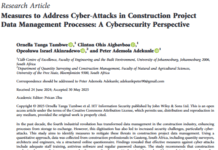Illustrative Image: July 2025: Paper of the Month by Owotemu, A. E., & Ibaru, A. – AI and Blockchain Revolutionizing Real Estate and Infrastructure in Africa: Insights from Nigeria, South Africa, and Egypt
Image Source & Credit: American Journal of Industrial and Business Management,
Ownership and Usage Policy
 July 2025: Paper of the Month by Owotemu, A. E., & Ibaru, A. – AI and Blockchain Revolutionizing Real Estate and Infrastructure in Africa: Insights from Nigeria, South Africa, and Egypt
July 2025: Paper of the Month by Owotemu, A. E., & Ibaru, A. – AI and Blockchain Revolutionizing Real Estate and Infrastructure in Africa: Insights from Nigeria, South Africa, and Egypt
A recent study by Owotemu, A. E., & Ibaru, A. (2025) titled “Technological Transformation in Infrastructure & Real Estate: Artificial Intelligence (AI), Blockchain (DLT), Project Management & Policy Implications across Leading Markets in Africa (Egypt, South-Africa & Nigeria)” published in American Journal of Industrial and Business Management, reveals that AI and blockchain are laying the groundwork for a smarter, more inclusive, and more efficient real estate ecosystem in Africa.
“
AI and blockchain significantly improve housing finance, project efficiency, and inclusivity in Africa’s real estate sector, especially in key markets.
– Owotemu, A. E., & Ibaru, A. (2025
This study explores the transformative role of Artificial Intelligence (AI) and Blockchain (Distributed Ledger Technology, or DLT) in shaping infrastructure and real estate development across key African markets—namely Egypt, South Africa, and Nigeria—between 2019 and 2023. It focuses on how these emerging technologies are redefining housing finance, project management, and policy formulation within the region.
AI is being increasingly utilized to optimize critical processes such as property valuation, tenant screening, and construction scheduling. Through tools like predictive analytics, generative AI, and computer vision, developers and policymakers are enhancing the affordability, accessibility, and sustainability of housing. Simultaneously, blockchain technology is revolutionizing property transactions by enabling secure, transparent, and tamper-proof systems. Decentralized platforms such as HouseAfrica and Empowa are leveraging blockchain to improve title verification, enable fractional property ownership, and expand access to real estate investment.
These innovations are not occurring in isolation—they are closely tied to shifts in policy and project management practices. By integrating AI and blockchain tools, construction timelines can be streamlined and operational risks reduced. However, the effectiveness of these technologies hinges on robust regulatory frameworks that ensure responsible and inclusive deployment.
Several real-world applications exemplify this digital transformation. HouseAfrica merges AI and blockchain to support affordable housing development. The EDGE Certification program is driving sustainable building standards across African cities. Meanwhile, Mellowcabs demonstrates how AI can enhance transport infrastructure in urban environments.
Importantly, these technologies are helping address persistent local challenges, including affordability gaps, project inefficiencies, and the limited access to housing finance among underbanked populations. Together, AI and blockchain are laying the groundwork for a smarter, more inclusive, and more efficient real estate ecosystem in Africa.
How the Study was Conducted
This study employed a comprehensive mixed-methods approach—merging qualitative and quantitative techniques—to provide a robust analysis of how Artificial Intelligence (AI) and Blockchain are reshaping infrastructure and real estate in Egypt, South Africa, and Nigeria. The research began with an extensive literature review, examining academic and industry publications on AI, Blockchain, and property development in both global and African contexts. This review identified key knowledge gaps and helped shape the study’s core hypotheses.
A quantitative analysis followed, using regression models to explore the relationship between macroeconomic indicators—such as GDP, interest rates, and exchange rates—and the adoption of AI and Blockchain technologies. The analysis assessed their measurable impacts on loan accessibility, project execution efficiency, and housing affordability across the selected countries.
To complement the numerical data, surveys were conducted with a diverse range of stakeholders, including real estate developers, government policymakers, and financial institutions. These surveys offered real-world insights into the levels of technology adoption, perceived advantages, and the practical barriers to integration.
Finally, in-depth case studies of platforms like HouseAfrica and Empowa provided concrete illustrations of how these technologies are being implemented on the ground. These case studies highlighted real applications in property management, affordable housing development, and sustainable construction practices.
What the Authors Found
The authors found that the integration of Artificial Intelligence (AI) and Blockchain technologies in African real estate and infrastructure—particularly in Nigeria, South Africa, and Egypt—significantly enhances housing finance accessibility, project efficiency, and affordability, while also supporting sustainable and inclusive urban development.
Why is this important
Smart Tech Tackles Real Housing Challenges: AI accelerates loan approvals and improves construction efficiency, while Blockchain streamlines land title verification—helping address Africa’s severe housing deficit and project management inefficiencies.
Empowering the Underbanked: AI-driven credit scoring enables banks to assess borrowers using alternative data, expanding housing finance access for millions excluded from traditional mortgage systems.
Data-Driven Policy and Investment Framework: The study offers concrete metrics—like increases in loan approvals and affordability—to guide governments and developers toward strategic, tech-enabled housing solutions.
Ethical and Social Responsibility Is Crucial: The research highlights risks such as algorithmic bias, job displacement, and digital inequality, calling for strong ethical frameworks and inclusive tech governance.
Sustainability Through Smart Urban Growth: With rapid urbanization, AI and Blockchain are key to designing green, climate-resilient infrastructure—enabling smarter, more sustainable African cities.
What the Authors Recommend
- The authors suggested launching AI and blockchain training programs for real estate and urban planning professionals, and build institutional capacity across public and private sectors.
- The study advocates encourage collaboration among governments, tech companies, and financial institutions to co-develop AI-powered housing finance tools and blockchain-based property systems.
- Develop localized policies that address Africa’s unique housing challenges, informal markets, and regulatory gaps, backed by regionally focused research.
- Integrate AI and blockchain with green standards like EDGE certification to support climate-resilient infrastructure and smart urban planning.
- Establish clear regulations to ensure AI transparency, reduce algorithmic bias, protect data privacy, and promote digital equity.
- Use AI for alternative credit scoring and blockchain for fractional property ownership, expanding housing access for underbanked communities.
In conclusion, the study underscores the transformative potential of AI and blockchain in addressing Africa’s real estate and infrastructure challenges. By enhancing efficiency, expanding housing finance access, and promoting sustainable urban development, these technologies offer a powerful blueprint for building smarter, more inclusive cities across the continent. However, their success depends on strong governance, ethical deployment, and strategic collaboration among key stakeholders.
















 The African Research (AR) Index is a comprehensive scholarly directory and database focused explicitly on journal publishers that publish and disseminate African research.
The African Research (AR) Index is a comprehensive scholarly directory and database focused explicitly on journal publishers that publish and disseminate African research.

